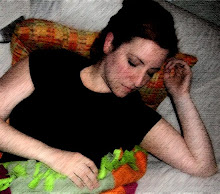Okay, so out the gate I'm going to extend the disclaimer that I am NOT a professional chef, cook, baker, etc. (Although I do still dream of someday being found worthy to take the torch from Martha Stewart... me and 50 million other creative ladies, right?).
Anyway, I'm inclined to share observations I've made about egg boiling. Many of you will read this post and snigger that I'd be so ignorant. Glad I could prove entertaining to you. For others who are oblivious, this just may prove to be the handiest thing you've ever read about boiling eggs... or the only thing you've ever read about boiling eggs.
Over the course of my cooking years I've tended to avoid making boiled eggs because, well, they stink. So, I tend to really only find myself preparing them once or twice a year. Once, for sure, at Easter. Maybe a second time when the call of egg salad or deviled eggs is just too much to bear. Also over the course of this time, I've had two schools of thought shared with me about how to prepare an egg. I'll share them as follows, with the pro and con for each.
As a nanny, the man of the house delightedly told me that there's a trick to boiling eggs without them cracking. "You see, you fill a pan with warm to hot water, place the cold eggs in the pan and then let them equalize for about five minutes. THEN turn on the heat to bring the water to a boil. The shells won't expand as much as quickly, hence no cracks." Don't know if that's verbatim how he shared that little tidbit, but boy howdy if he wasn't totally spot on! I think I can count on one hand the number of times an egg cracked since learning this method of prepping.
So, the Pro to this 'equalization' concept is that you'll have less/no cracked eggs. But the Con I've discovered: when the egg cooks, the inner membrane doesn't detach readily from the white, making the eggs sometimes ridiculously hard to peel. Misery.
The other method for boiling eggs is a distant memory from childhood, reconfirmed with (ahem) "diligent" internet surfing. hee hee. Anyway, in this approach, you bring a pan of water to a rolling boil and then use a slotted spoon to gently set eggs fresh from the fridge into the pan. The Pro of this approach is that you will have eggs with shells that peel off incredibly easy (at least, compared to those cooked with the other method). Not sure of the chemistry behind the whole thing, but what is obvious to me is that the inner membrane is separate from the egg white and more strongly attached to the shell, allowing you to pull it off in much larger pieces.
So, the Pro to the 'flash boil' concept is that you'll have easy to peel eggs. But the Con: more cracked eggs. In the past week of Easter egg cooking, I had at least three cracked eggs out of eighteen eggs total.
So, there you have it. Hope this little tidbit helps out at least one frazzled cook in the kitchen where the homely hard-boiled egg is concerned. Happy boiling!
Subscribe to:
Post Comments (Atom)

No comments:
Post a Comment